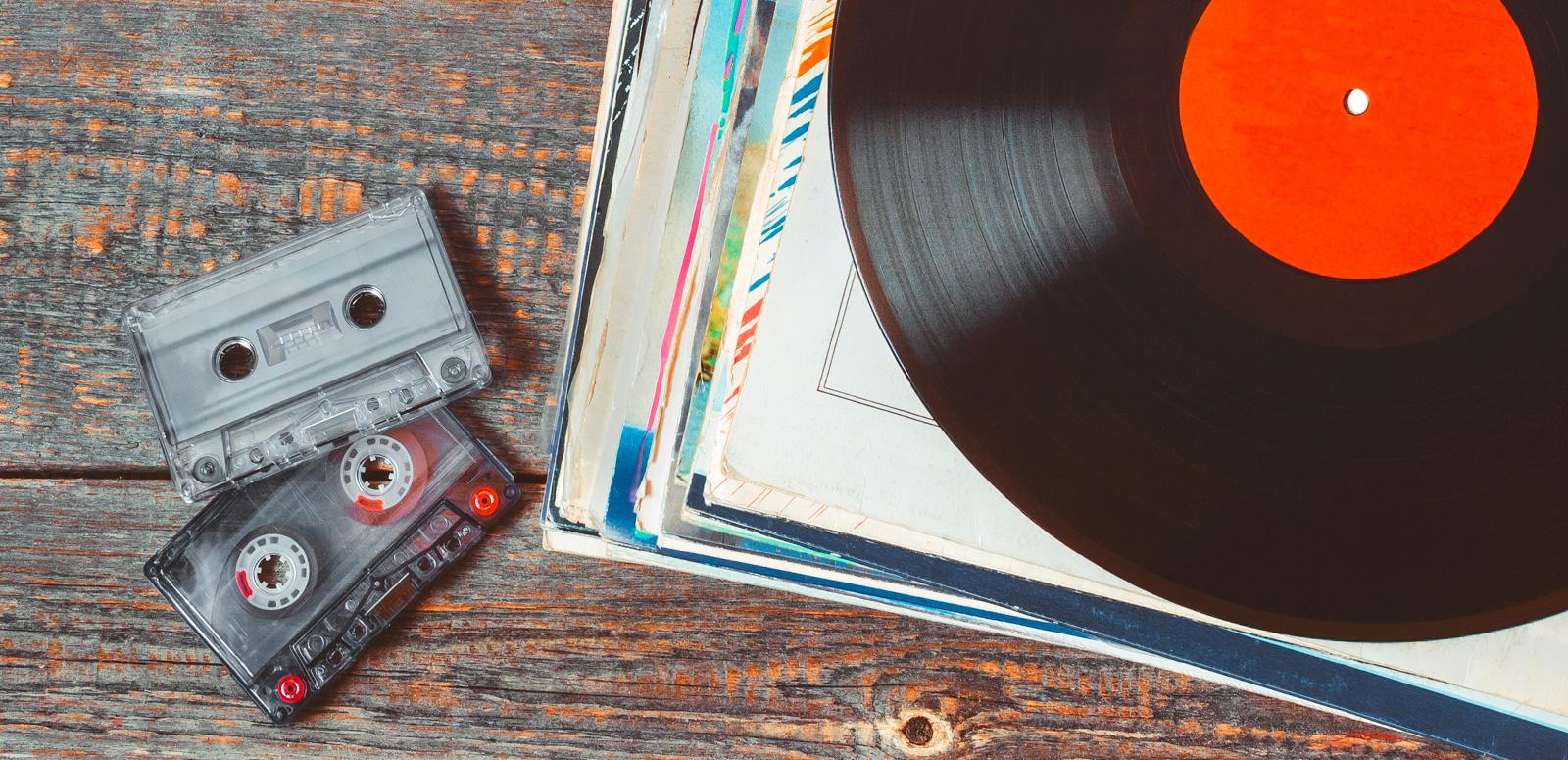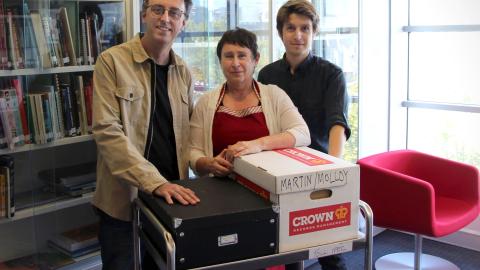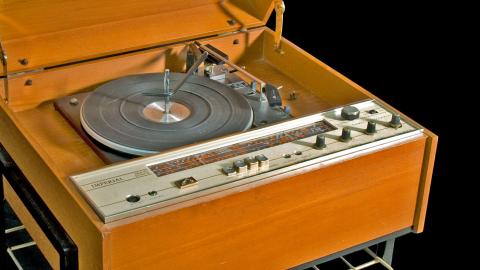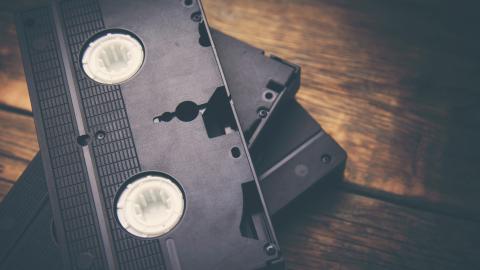

Caring for audio
Caring for audio
Introduction
Audio collections consist of a variety of different materials, the most commonly occurring are discs (records) and tapes. Older collections may also contain cylinders.
The later and most common discs are pressed from vinyl from a master recording, while earlier `instantaneous’ recordings are made from special plastics coated onto a solid base. Magnetic tape consists of a plastic polyester backing onto which a layer of magnetic material (metal or oxide) and binder is coated. The proper care of audio tapes relies upon looking after both the base and the magnetic layer in which the sound information is contained.
How long will audio tapes and discs last?
The oldest tapes stored in archives are still playable after 40 or 50 years, and discs have survived for a century or more. This potential lifespan can be considerably reduced if recordings are not manufactured, handled and/or stored correctly. Some tapes and discs have failed in less than ten years as a result of chemical instability, inadequate storage or improper handling.
When tapes last this long other factors such as the life of the format (availability of working replay equipment) become as important as the life of the tape itself.
How should tapes and discs be handled and stored?
Sound recordings need to be handled correctly to avoid contamination or other damage. Even when your hands appear clean, traces of sweat and oil are present which can attract dust or promote mould growth when deposited on a recording.
The playing surfaces of a disc or tape should not be handled: reels of tape should be carried by the hub or centre; and discs should be held only on the edges and label. It is normally safer to use arm lifters when playing LPs or 78s, rather than raising or lowering the stylus by hand.
Unless being played or cleaned, recordings should be kept in their sleeves/boxes, which also offer physical protection and resistance to fire and water damage. Recloseable plastic envelopes with suitable liners will protect against dust, moisture and mechanical damage.
Discs and tapes should be stored in cool, dry conditions with a minimum of dust and pollutants, and shelved upright in sturdy shelves with dividing supports every 100mm-150mm. Hubs used for storing tapes should be smooth and rigid. Changes in temperature or humidity, direct sunlight, local heat sources, moisture, dust and magnetic fields should be avoided.
Cassette boxes should have projections to lock the hubs and prevent them from turning during storage or movement. Tapes and cassettes should be played to the end, leaving the tape wound smoothly with only leader or unrecorded tape exposed. Reels of tape should have the end fastened with an approved tape or packing which avoids uneven pressure.
Compact discs benefit from the same cool, dry conditions and careful handling as other sound recordings. The standard CD jewel case offers good protection for CDs and they can be stored either vertically or horizontally when kept in their cases.
Will tapes and discs last longer if they are not used?
Tapes should be played through or respooled every few years to check their condition and to minimise any tendency for layers to stick together or to print-through magnetically.
Before reproducing any tape which has not been used for a long time (many months or years) it should be carefully rewound 2-3 times to relieve any tension in the tape and to reduce the effect of print-through.
Can household appliances damage tapes and discs?
Magnetic recordings on tape, cassette or disc are made and destroyed by magnetic fields. The permanent magnets in headphones and compact loudspeakers can produce a strong magnetic field which may damage the tapes if they are stored in close proximity.
Normal house wiring is not usually a problem, however high voltage power lines and lightening arresters in large buildings can produce dangerous levels of electromagnetic interference. Security scanners and X-ray equipment aren’t usually harmful, but it is wise to check first, particularly with newer digital systems.
The most likely articles found in the home that can affect tapes are those with small powerful magnets, for example, magnetic flashlights, fridge magnets, small headphones, speaker cabinets etc.
CDs are not affected by electric or magnetic fields.
How can you clean or restore tapes and discs?
Before playing, discs with light contamination (such as airborne dust) should be cleaned by hand using a suitable brush, with antistatic treatment as required. Keep a separate brush for 78’s and LP’s if you have both.
Clean extensive contamination, including mould, from disc surfaces and tape edges before further handling. The flanges on the tape spools may be removed if necessary. An effective cleaning solution is a 1% solution of cetrimonium bromide in distilled water (available from well stocked pharmacies). Rinse and dry with a soft cloth.
If tapes or discs get wet, remove all moisture as quickly as possible. If flooded with dirty water, rinse with distilled water, trying to minimise any more exposure than necessary. Special cleaning machines are used by archives and professional engineers for maximum effectiveness.
Warped discs may be temporarily flattened by gentle and precise heating before playing, but professional help is recommended. With tapes, any splices or leaders that show signs of deterioration should be renewed.
Clean CDs by wiping across the direction of the recorded signal – never in a circular motion. Care should be taken not to scratch the label side as it is much thinner than the clear playing surface.
What extra precautions can you take?
It is a good idea to copy (dub) old, fragile or extremely valuable recordings if you wish to listen to them often. Vinyl or shellac discs may last longer than tape chemically, but they can wear out more readily through repeated playback. Playback equipment such as tape decks and turntables should be cleaned and adjusted regularly, making sure that the recordings themselves are clean.
When older recordings are being dubbed onto a new copy, electronic filtering can sometimes be effective in removing unwanted noise and the effects of wear or damage. Both original recordings and copies should be clearly labelled. If you play a really dirty CD, damage will occur. However, normal playing will not cause any wear.
Should you use head cleaning tapes?
If the heads do need cleaning they should preferably be cleaned manually by a trained person. Cleaning tapes should only be used as a last resort as some types can cause premature head wear or damage. Heads and guides, rollers and other components in the tape path should be cleaned with a swab of isopropanol (rubbing alcohol). A wet cleaning tape/cassette is usually preferable to the dry, abrasive types.
Can Australian tapes be used on overseas machines?
Yes. Unlike video materials, the audio industry has managed to standardise its materials, and recordings manufactured anywhere in the world can be played in other countries.
How can I protect my audio from natural disaster?
In an emergency such as flood or bushfire, you should be conscious of which recordings are truly irreplaceable (e.g. a unique recording of baby’s first words or a deceased relative) and commercial recordings or equipment which may have monetary value but which could be replaced if necessary.
You should consider safeguarding any recordings of great personal importance from extreme hazard by copying them and storing the copies elsewhere. In the event of a flood, evacuate the recordings or store in a sealed container — try to avoid them becoming wet. In the event of a fire, evacuate the recordings or bury them in a sealed container.
For professional assistance in the event of such a disaster, or if you notice unusual things happening to your recordings, seek professional advice. If tapes show any signs of shedding, sticking or squeaking, or if recordings develop a strong smell of vinegar or a 'plastic/organic’ odour, this is usually a sign that they are chemically deteriorating and probably require expert treatment. On any recording also look out for crazing, cracks or other damage, and mould, contamination or interaction with packaging.
Please note – The advice given here in regard to the care of audio material is based on best international experience and the best information available to the NFSA. However, given the different circumstances applying to the condition of any particular audio item we cannnot be responsible for the application of this advice in any particular circumstances. To be sure of the best care of your audio item you may wish to seek specialist advice.
Download Fire affected audio materials
The National Film and Sound Archive of Australia acknowledges Australia’s Aboriginal and Torres Strait Islander peoples as the Traditional Custodians of the land on which we work and live and gives respect to their Elders both past and present.


